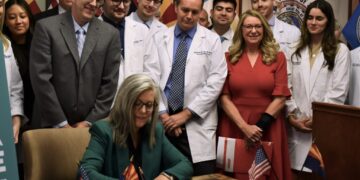The annual Missouri “report card” published by the March of Dimes shows Missouri in the bottom half of the country for infant and maternal health outcomes (Getty Images).
Missouri babies and mothers continue to die at higher rates than the national average, a new March of Dimes report found.
Now, despite some statewide efforts to improve health outcomes, the threat of federal health care funding cuts could worsen the problem, health care professionals say.
The annual Missouri “report card” published Monday by the March of Dimes again lands the state squarely in the bottom half of the country for rates of infant mortality, maternal mortality, preterm births and severe maternal morbidity.
“This is not the time to let our foot off the gas,” said Dr. Michael Warren, chief medical and health officer with March of Dimes. “We are among the most dangerous high income countries in the world for giving birth, and so we really need to be doubling down on our efforts to make sure that everybody has access to care.”
That’s why Warren is keeping a close eye on President Donald Trump’s “One Big Beautiful Bill Act,” which cleared Congress earlier this year and could have dramatic implications for families by reducing the funding going to state Medicaid programs.
“In places like Missouri, where almost 40% of your births are covered by Medicaid, that really has the potential to make maternal illness and health outcomes worse,” he told The Independent Monday. “It has the potential to increase closures of rural hospitals and places where moms can get access to prenatal care.”
While infant mortality rates decreased slightly from 2022 to 2023, maternal mortality rates worsened, according to the nonprofit focused on infant and maternal health outcomes.
Missouri again earned a “D” for its preterm birth rate.
In 2024, more than 7,400 — or 11% — of babies born in Missouri were preterm, before 37 weeks gestation. This is the same rate as the year prior, and lands Missouri at 37th worst state in the country for prematurity rates.
“One of the things that really jumps out to me is a high rate of chronic diseases among women even before they become pregnant,” Warren said, adding that chronic conditions like high blood pressure, diabetes, obesity and smoking increase the risk of preterm birth.
Warren noted that while Missouri has remained stuck at a D grade for premature births, the U.S. overall remains at a D+.
“This is a call to action for us,” Warren said. “The United States is among the most dangerous high income countries in the world for giving birth, and these numbers help explain why.”
While the state’s infant mortality rate improved slightly from 2022 to the latest 2023 data, 441 babies still died before they turned 1 year old in Missouri in 2023. Missouri ranks 33rd in the nation for infant deaths, with infant mortality rates for children born to Pacific Islander mothers 2.5 times the state average between 2021 and 2023, the most recent years analyzed.
Missouri aid for moms and babies to continue as other food assistance ends during shutdown
The leading causes of death for infants in Missouri between 2021 and 2023 were birth defects, preterm birth, sudden unexpected infant death and accidents, according to the report.
“All of those lost babies are so much more impactful than people realize, because it is the loss of these parents’ future,” said Denise Côté-Arsenault, a professor of maternal child nursing at Saint Louis University.
Côté-Arsenault, a nurse whose research focuses on bereaved parents, also noted the lack of mental health support for new mothers in Missouri in the report.
Missouri does not require clinicians to screen women insured by Medicaid for postpartum depression during their child’s pediatric visits. Missouri Medicaid also doesn’t reimburse for this screening, as is recommended by the March of Dimes.
In 2024, 38% of births were covered by Medicaid.
A year prior, Missouri expanded Medicaid coverage through the first year postpartum. Warren applauded this decision, but said the state should go one step further by expanding medicaid coverage to include maternal mental health screenings.
Mental health conditions accounted for one-third of recent pregnancy-associated deaths in Missouri, according to the most recent maternal mortality report published over the summer by the Missouri Department of Health and Human Services. This includes substance use.
Warren said this review board, as well as a new Missouri law that allows doulas to be reimbursed through Medicaid, are among the improvements Missouri has made in recent years that he hopes will begin yielding better outcomes.
Mothers and babies of color and mothers insured by Medicaid continue to make up an outsized portion of the data, complicated by factors like poverty, racism and violence, she said.
“Unless we have constant support and changing social situations, we’re not going to make much headway overall,” Côté-Arsenault said. “ …These folks need more health care, not less.”
In addition to the cuts to Medicaid, she is also watching other policy changes that impact low-income families, such as threats to local Head Start programs and efforts to improve access to affordable child care.
The March of Dimes report also recommends Missouri require paid parental leave.
But Côté-Arsenault, who has spent nearly 50 years working with mothers and babies, said increasing support for community health, creating more public health programs for mothers and babies (including postpartum home visits) and increased specialized educational support for nurses could make a difference.
It’s going to take a concerted effort on a local and federal level.
“A lot of people are looking for an easy fix,” Côté-Arsenault said. “And there isn’t one.”
This post was originally authored and published by Anna Spoerre from Missouri Independent via RSS Feed. Join today to get your news feed on Nationwide Report®.


























